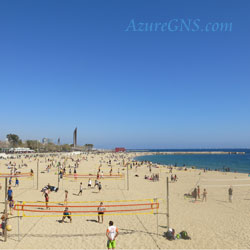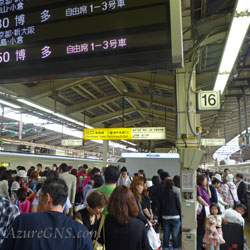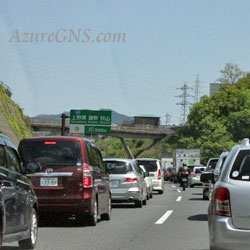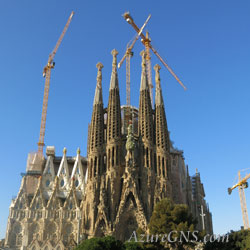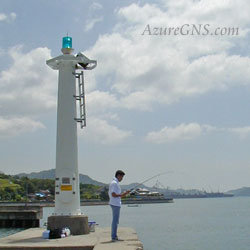(4月末から5月の初めまで)
Goruden-uiiku
The Golden Week
(from the end of April to the beginning of May)
●ゴールデンウィーク the Golden Week
●国民の祝日 national holiday
●昭和の日 Showa-no-hi; the Showa Day
●みどりの日 Midori-no-hi; the Greenery Day
●メーデー May Day
●憲法記念日 Kempo-kinenbi; Constitution Memorial Day; Constitution Day
●こどもの日 Kodomo-no-hi; Children’s Day
●ハッピーマンデー制度 the Happy Monday System
●国民の休日 Kokumin-no-kyujitsu; the National Day of Rest
●休暇 vacation; holiday
●帰省 homecoming
●交通渋滞 traffic jam; holdup; 【米Am.】(交通事故などによる)tie-up
●旅行 (一般的な語)travel; (一般的な語)trip;
(比較的長期の通例陸路の旅行)journey;
(観光などの周遊旅行)tour; (長い船旅、宇宙旅行など)voyage
●国内旅行 domestic tourism
●海外旅行 traveling abroad; a trip abroad
◆4月の終わりから5月の最初までいくつかの祝日があります。
There are several holidays between the end of April and the beginning of May.
◆もし国民の祝日が日曜日と重なると、ハッピーマンデー制度により、翌日の月曜日が休日となります。
If a national holiday falls on Sunday, the following Monday becomes a holiday by the Happy Monday System.
◆4月29日は国民の祝日の昭和の日で、以前は昭和天皇の誕生日として祝われていました。
April 29th is Showa-no-hi, a national holiday, and during the Showa period, this day was cerebrated as the Emperor’s Birthday.
◆5月1日は祝日ではありませんがメーデーなので、多くの人は仕事が休みです。
May 1st is not an official holiday, but it is May Day, and many people do not have to work.
◆5月3日は国民の祝日の憲法記念日です。
May 3rd is a national holiday, Kempo-kinenbi, Constitution Memorial Day.
◆5月4日は国民の祝日のみどりの日です。
May 4th is a national holiday, Midori-no-hi, the Greenery Day.
◆1986年から2006年までは、年によって、5月4日は国民の休日という名前の国民の祝日でした。
From 1986 to 2006, May 4th was a national holiday, Kokumin-no-kyujitsu (the National day of rest).
◆5月3日と5日を共に連休にするため4日を休日にしました。
May 4th was made a holiday to create a stretch of consecutive holidays, by connecting May 3rd and May 5th.
◆しかし4日が日曜日か月曜日ならば自然と3連休になるため、国民の休日にはなりませんでした。
However, if the 4th fell on a Sunday or a Monday, a national holiday was not observed, since it automatically became a holiday.
◆5月5日は国民の祝日であるこどもの日です。
May 5th is a national holiday, Kodomo-no-hi, Children’s Day.
◆この数日間の休日をゴールデンウィークと呼びます。
This sequence of holidays is called the Golden Week.
◆ゴールデンウィークはお正月休みと、8月のお盆休みに並ぶ長い休みです。
The Golden Week is a long vacation in addition to the New Year’s holiday and the O-bon holiday in August.
◆数年に一度、休日と日曜日の並びにより9月に5連休となる場合があり、この大型連休をシルバーウィークと呼びます。
Depending on when the national holidays and Sunday fall, if we have 5 consecutive days off in September, once in several years, we call it the Silver Week.
◆ゴールデンウィークを利用して、多くの人々は帰省したり、国内外へ旅行をしたりします。
Many people take advantage of this time to visit their hometown, or other areas of Japan, or even take a trip abroad during the Golden Week.
◆この時期、交通機関はとても混雑します。
During this time travel facilities are very crowded.
◆特にゴールデンウィークの始まりと終わりは高速道路が何十キロと渋滞します。
Especially at the beginning and end of the Golden Week, there are tens-of-kilometer long traffic jams on highways.
◆パックツアーや宿泊施設が普段と比べてずっと値上がりします。
Package tours and accommodations are much more expensive than usual.
◆日本人は長時間働き過ぎだと言われてきました。
The Japanese have been said to work too hard for too many hours.
◆しかし最近は多くの職場や学校が週休2日制になりました。
Recently, however, many workplaces and schools are introducing a five-day work week.
◆今、このような長い休暇を利用してもっと余暇を楽しめるようになってきました。
People can now enjoy more leisure time during these long vacations.
Copyright (C) Azure Global Network Services. All Rights Reserved.
